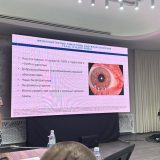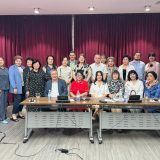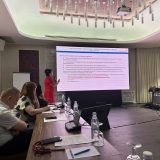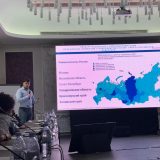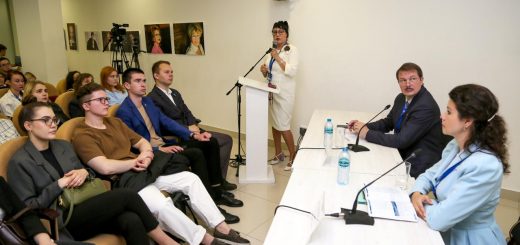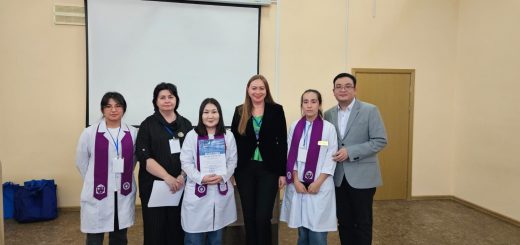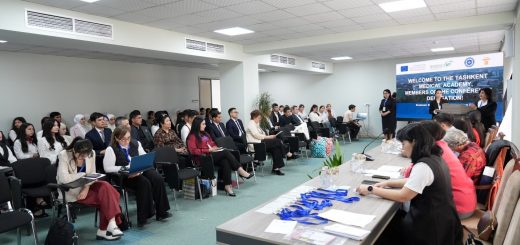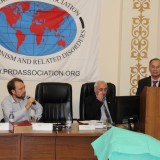Masterclass «Features of Managing Patients with Plexiform Neurofibromas in Neurofibromatosis Type 1»
On June 14, 2025, a Masterclass on the topic “Features of Managing Patients with Plexiform Neurofibromas in Neurofibromatosis Type 1” was held in Almaty. The main objective was to identify the needs and modern possibilities of a multidisciplinary approach in diagnostics, monitoring, and the challenges of transitioning patients from pediatric neurology services to adult dispensary care. The masterclass was attended by neurologists, oncologists, geneticists, cardiologists, and specialists in rare (orphan) diseases.
Neurofibromatoses (NF) are a group of hereditary diseases characterized by the development of tumors of the central and peripheral nervous system. This group includes three distinct nosologies: Neurofibromatosis Type I, Neurofibromatosis Type II, and Schwannomatosis. These diseases have dynamic development and share similar clinical manifestations, complicating the clinical diagnosis, especially at the early debut stage. At the same time, the emergence of new pathogenetic therapies and the high risk of hereditary transmission underline the importance of early diagnosis. One of the key methods of confirming a suspected diagnosis is molecular genetic testing.
Cutaneous neurofibromas are common manifestations that arise along small peripheral nerves. During late childhood, these skin tumors of various sizes and shapes appear in quantities ranging from a few to several thousand. They may be flesh-colored, pinkish, or tan and are usually asymptomatic.
Plexiform neurofibromas may develop and tend to grow to large sizes, forming asymmetrically thickened and deformed masses, sometimes with hypertrophic defects, potentially affecting nerves and other structures. Plexiform neurofibromas may also involve cranial nerves.
Neurological symptoms vary depending on the location and number of neurofibromas. Large neurofibromas may cause nerve compression and pressure on surrounding tissues, resulting in distal paresthesia, pain, sensory loss, or weakness, depending on the function of the affected nerve. Neurofibromas located along the spinal nerve roots may cause radicular pain, weakness, or widespread sensory loss in the affected area. Plexiform neurofibromas compressing cranial nerves can impair the functions controlled by these nerves, affecting vision, swallowing, and breathing.
Leading specialists from the Russian Federation (Moscow) were invited to share their experience on NF1. The lecture “Features of the Course and Management of Plexiform Neurofibromas in Neurofibromatosis Type 1 in Children and Adults: Similarities and Differences” was delivered by Dorofeyeva M.Yu., PhD, a leading neurologist from Pirogov Russian National Research Medical University. The topic “Key Approaches to the Treatment of Patients with PN in NF1 Across Different Age Groups: Theory and Practice” was presented by Tararykova A.A., PhD, an oncologist from the Blokhin National Medical Research Center of Oncology. Vasiliev P.A., a geneticist from the Bochkova National Medical Genetic Research Center, spoke about the role of registries in diagnosing and managing patients with NF1.
The Department of Nervous Diseases of KazNMU named after S.D. Asfendiyarov actively participated in the event. Head of the Department Turuspekova S.T. introduced the audience to the features of monitoring adult patients with rare neurological diseases in the Republic of Kazakhstan in light of the approved Standard for Neurological Care for the Adult Population. Professor Idrisova Zh.R. shared her unique experience in managing patients with NF1 and emphasized key aspects of their care. Z.D. Dushimova, PhD, Head of the Center for Orphan Pathology of the Research Institute of Cardiology and Internal Diseases, presented approaches to managing adult orphan patients in Kazakhstan. G.O. Zhienkulova, Head of the Department at UMC Children’s Oncology and Hematology Center, and A.K. Kurmanaliev, an oncologist at the Kazakh Research Institute of Oncology and Radiology, also shared their experience with NF1 patients.
The masterclass was of great educational importance, emphasizing that a multidisciplinary approach often leads to more effective and comprehensive problem-solving, improved outcomes, and enhanced quality of life for patients. It highlighted the need for specialists from different fields to interact, share information, and coordinate their efforts to achieve a common goal.
The masterclass was held with informational support from the Representative Office of AstraZeneca UK Limited in the Republic of Kazakhstan.





